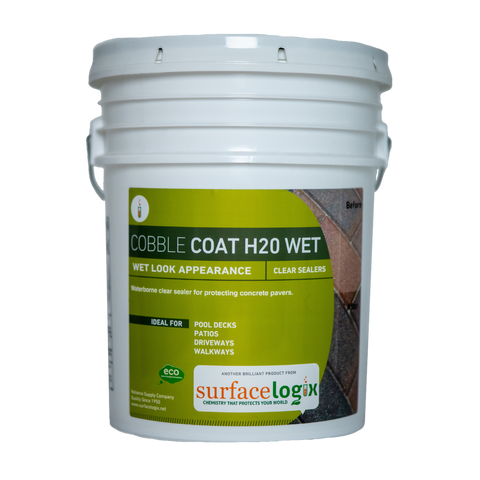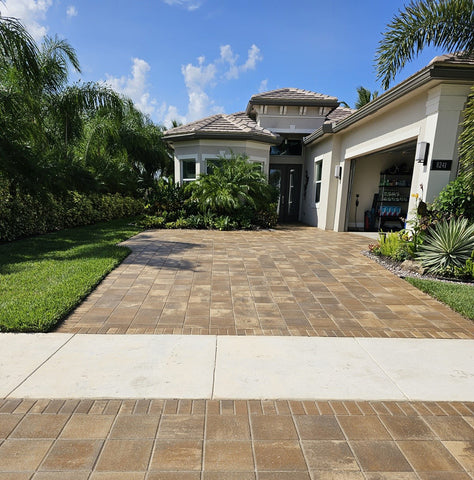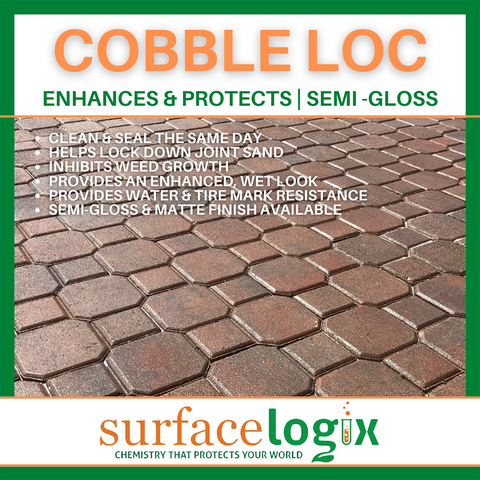What Are the Benefits of Sealing My Pavers?
If you have pavers in your outdoor space, you've probably thought about choosing the right materials and design. Pavers are an excellent aesthetic addition to your driveway, pool deck, patio, and other hardscapes, making them an investment worth protecting. Sealing your pavers is one of the best ways to keep them in pristine condition for an extensive duration.
Benefits of Sealers for Pavers:
1. Protection from Harsh Weather and Enhanced Durability
Why seal pavers? Here, we'll provide further insight into the key benefits of doing so.
One of the primary benefits of sealing your pavers is protection from harsh weather and other elements. Weather can affect your pavers, causing them to fade, crack, or discolor. Sealing your pavers, on the other hand, helps to prevent this damage by creating a barrier between the pavers and the elements.
In addition to protecting your pavers from extreme sun, high water tables, and increased humidity, sealing enhances their overall durability. The sealer helps to reinforce the pavers, making them more resistant to cracking, chipping, or breaking. This increased durability can help extend the lifespan of pavers, ultimately saving you repair expenses in the long term.
2. Resistance to Stains From Oil, Grease, and Other Substances
Another advantage of sealing pavers is the added resistance to stains from substances like oil, grease, and other liquids. Unsealed pavers are more porous than sealed pavers. They're more likely to absorb stains and are difficult to clean. Sealing pavers creates a protective barrier that makes it easier to clean up spills before they have a chance to stain the surface.
3. Enhanced Natural Colors
Sealing pavers can also help to enhance their natural colors. Pavers are available in a range of colors, but over time, UV rays and weather can cause them to fade. Sealing your pavers with Surfacelogix's natural look sealers helps to enhance their fresh color. Our water-based sealers can help enrich your brick's color, resulting in a wet, natural, or matte look.
4. Prevention of Mold and Weed Growth
Pavers that aren't sealed are more likely to accommodate mold, milder, and weed growth. These unsealed pavers are porous and provide a hospitable environment for these unwanted guests.
Sealing pavers creates a protective barrier that limits the entry of air and moisture. These unsuitable conditions make it more difficult for mold and weed growth to take root, keeping pavers tidy.
5. Stabilized Sand Between Your Pavers
Why should I seal pavers? Sealing your pavers or your clients' helps to stabilize the sand between them. When it rains, the sand between unsealed pavers can easily wash away or dislodge during pressure washing, leaving gaps. A paver sealer acts like a glue that helps to keep the sand in place, ensuring a level and stable surface.
6. Prevention of Insect and Pest Intrusion
One of the most significant benefits of sealing pavers is the prevention of insect and pest intrusion. Pavers that are not sealed can become an ideal habitat for insects and pests, which can quickly become a major bug infestation.
In addition to making your outdoor space less inviting, insect and pest intrusion can lead to costly repairs and pest control measures. The paver sealers help to create a barrier that keeps insects and pests out, reducing the likelihood of damage and infestations.
7. Shinier Bricks and an Improved Final Look
 Sealing your pavers can also help improve your outdoor space's overall look. Unsealed pavers risk UV damage from extensive exposure to sunlight over time. Pavers that are sealed using our semi-gloss wet look sealers tend to have a more vibrant and polished appearance, making them more aesthetically pleasing.
Sealing your pavers can also help improve your outdoor space's overall look. Unsealed pavers risk UV damage from extensive exposure to sunlight over time. Pavers that are sealed using our semi-gloss wet look sealers tend to have a more vibrant and polished appearance, making them more aesthetically pleasing.This sealer can particularly help to achieve a specific design or style in an outdoor space. Sealing pavers can help make the bricks shine, highlighting their natural beauty.
8. Protection Against Salt Damage
If you live in an area with harsh winters, you're probably familiar with the damage from using salt and de-icing chemicals. Pavers that are not sealed can be particularly vulnerable to this type of damage. The salt and chemicals can easily penetrate the surface, causing cracking and other types of damage to your outdoor attraction. Sealing your pavers creates a barrier that prevents the salt and chemicals from seeping into the surface.
9. Water Repulsion
Depending on your chosen sealer, sealing your pavers also helps minimize water absorption. Water can cause significant damage to pavers over time, leading to cracking and staining. Sealing your pavers with a water-repellent sealer can help to keep water from penetrating the surface, reducing the likelihood of damage and prolonging the life of your pavers.
10. Easier Cleaning
Pavers that are not sealed can be challenging to clean, as dirt and debris tend to become ingrained in the surface over years and seasons. Sealing your pavers can make cleaning easier as the surface becomes smoother and less porous. This makes it easier to sweep away dirt and debris, making power washing more effective. Sealing your pavers can help keep them looking clean and well-maintained with minimal effort.
11. Improved Home Value

Finally, sealing your pavers can help improve your home's value. Pavers that are well-maintained and protected against damage can be a major selling point if you're planning to put your home on the market. A well-maintained outdoor space can also make your home more appealing to prospective buyers, helping to increase the overall value of your property.
Do I have to seal pavers?
Sealing pavers offers various benefits, from preventing insect and pest intrusion to improving the overall look of your outdoor space. It also protects your pavers from harsh weather and stains, enhancing the stone's natural colors and preventing mold and weed growth. In addition, the paver sealers safeguard against salt damage, repel water, and make cleaning easier.
With these benefits in mind, sealing pavers is a wise investment. Choosing the right sealer for these pavers is an important decision, as it can significantly impact the appearance and longevity of outdoor spaces. At Surfacelogix, we provide high-quality sealers, coatings, and cleaners for various surfaces and pavers. Contact us today for superior clear coatings and sealers.
To view our complete collection of paver sealers click here.



2 comments
Explore the top 11 reasons why sealing pavers is essential for maintaining their beauty and longevity with SurfaceLogix’s informative guide. From enhancing color and preventing weed growth to protecting against stains and erosion, this resource highlights the numerous benefits of sealing pavers. Thanks for sharing these compelling reasons to invest in paver sealing! https://paversealingriverviewfl.com/